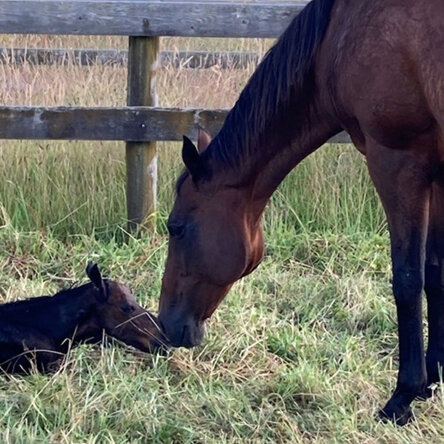Franklin Vets
Franklin Vets - excellence in veterinary care for dairy, farming, lifestyle, equine and household pets. BESTPRACTICE ACCREDITED NZ.
Your account is powered by Storbie. To edit your profile visit my.storbie.com
Your account is powered by Storbie. To edit your profile visit my.storbie.com

In the first eight months of pregnancy, the mare’s nutritional requirements remain the same as when she conceived. However, In the last trimester, her requirements increase as this is when most of the foetal growth occurs.
Most of her diet should be fresh pasture with additional forage as required, but she will additionally need a balanced mineral and vitamin mix specially formulated for pregnant mares.
Vitamin & mineral mixes should include calcium, phosphorous, copper, zinc, iron, manganese and vitamin E. These mixes are usually incorporated into a balanced commercial broodmare feed. They can also be added to a lower energy ration such as chaff or sugar beet if your mare is in good body condition.
It is important that broodmares receive regular dental care to enable them to better digest their feed.
Mares should receive tetanus and strangles boosters 4 weeks prior to foaling to give the mare protection and enhance colostral immunity. Foals rely on the sufficient transfer of antibodies in the colostrum to prevent disease before their own immune systems are well established. Other vaccines may be needed depending on the mare and other factors, best discussed with your veterinarian.
Routine deworming throughout gestation will significantly decrease the newborn foal’s early exposure to parasites and help to keep the mare in optimum health. The type of anthelmintic and frequency of each dose should be based on the mare’s individual parasite load and farm management practices.
The larvae of the intestinal threadworm, Strongyloides westeri are of particular concern as they can migrate to mammary glands and be passed to the foal through the milk, often causing diarrhoea. Worming mares during the month before foaling will reduce the number of these parasites passing to the foal.
If foal scours is a problem on your property, giving foaling mares a dose of ivermectin on the day of foaling may be beneficial.
Dr Catherine Pemberton BVSc
Franklin Vets - excellence in veterinary care for dairy, farming, lifestyle, equine and household pets. BESTPRACTICE ACCREDITED NZ.



